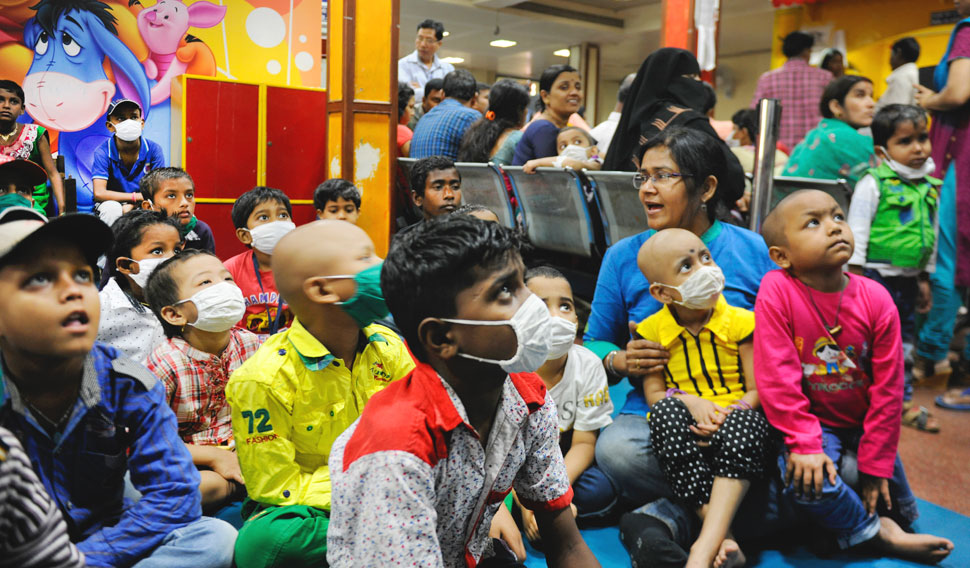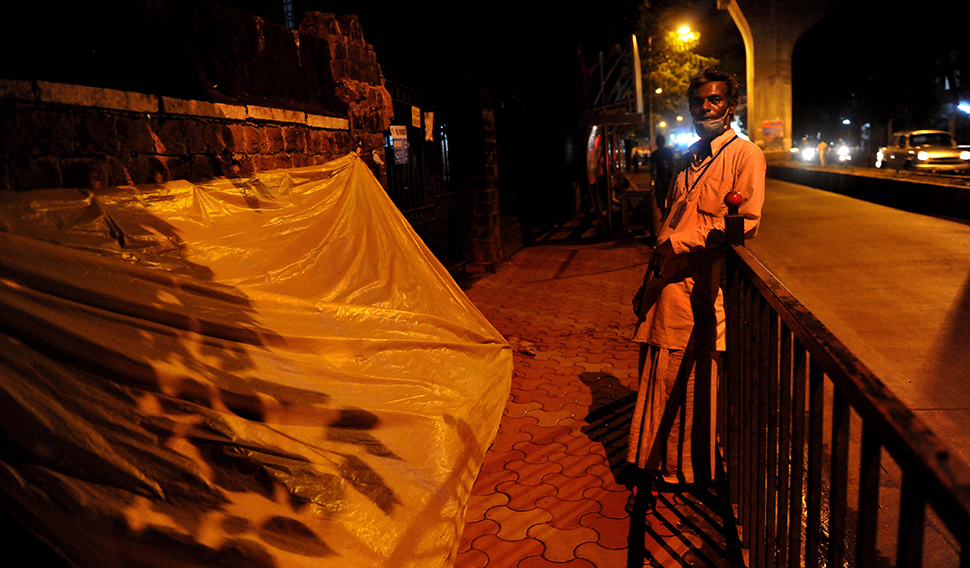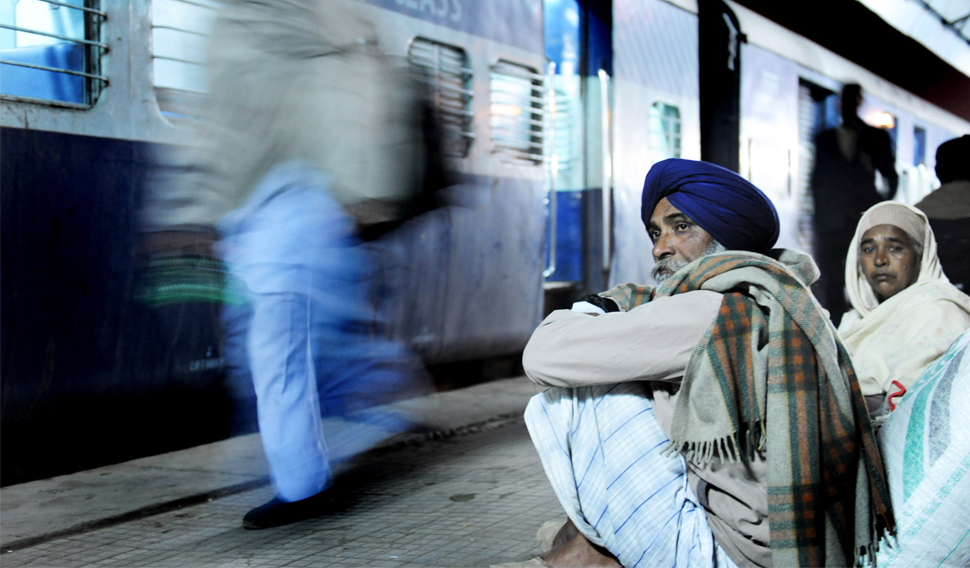
THE INDIAN HERO
Spoonful of succour

Swagata Yadavar
May 17, 2015

Daily, Harakchand Sawla, 58, and his volunteers provide freshly cooked khichdi, dal, roti and vegetables for cancer patients and their relatives
It is noon, and the office of Jeevan Jyot trust, opposite the Tata Memorial Hospital in Parel, Mumbai, is buzzing with activity. It is time to feed the patients and their relatives from across India who have made the footpath outside the hospital their home, with hope being their sole comfort, as their relatives battle it out against the big C. The trust’s office, a tiny rented space, is filled with books, toys, clothes to be distributed to patients, stacks of files, newspapers and vessels with food. Trust founder Harakchand Sawla, dressed in a white kurta and pyjama, is being briefed about the new changes on their website. In between, he answers his phone that rings every few minutes, and directs his staff on the lunch arrangement.
Sawla, 58, has dedicated his life to the service of needy cancer patients and their relatives. “They come from remote villages in India. They usually sell their property and jewellery before they come here and struggle to find a roof over their head and to manage the expenses,” he says. Daily, he and his volunteers provide freshly cooked khichdi, dal, roti and vegetables. People come to him not just for food, but also for advice, assistance and reassurance—all of which is offered free, with a smile.
Helping the needy has been second nature to Sawla, who was born in a middle-class Kutchi family. Even as a child, he used his bus fare to pay the fees of his friend, whose father had died; he would instead walk all the way home from school.
But what made him serve cancer patients? Thirty years ago, Sawla started working for cancer patients, he says, as an act of repentance for giving wrong information to a patient. “An acquaintance of mine had asked me to guide her when her mother was diagnosed with breast cancer,” he says. “I had no prior knowledge about cancer, but I agreed to help her as she was young and had no one else to rely on.” He took them to the Tata Memorial Hospital, but instead of the general wing, he took them to the private wing. On inquiring about the cost of treatment, he knew the girl could not afford it. So, he took them to Sion Hospital, where her mother was treated free of cost. But, he had to visit the Tata Memorial Hospital several times to submit and collect reports. On one such visit, he learnt the hospital had two wings and patients were treated free of cost in the general wing. When he apologised to the girl and her mother, the girl told he was like God to her. “She said that but for me they would have gone back to their village and her mother would have died,” he recalls.
"My father warned me, ‘Travel by bus, spend your own money if you wish to do this work....’ This has been my mantra to date" - Harakchand Sawla, founder, Jeevan Jyot trust
Sawla realised that hundreds of patients who were directed to the Tata Memorial Hospital for cancer treatment were clueless about where to go and how to get help. And thus began his service. But Sawla was by no means a rich man. He initially worked with a company that supplied raw materials to factories, and contributed a chunk of his salary towards feeding patients. As the number of people he fed increased and he was unable to pay the cook for three months, he started the Jeevan Jyot trust 18 years ago. But Sawla refuses to charge a cup of tea to the trust, let alone draw a salary from it. He says he has his father to thank for his principles. “My father warned me, ‘Travel by bus, spend your own money if you wish to do this work. Don’t use the money to travel in luxury.’ This has been my mantra to date,” says Sawla.
After he quit his job, he got into marketing for some time and later started a restaurant. It was on his wife’s advice that he started working full-time for the trust ten years ago. “My wife has never asked me for any jewellery or new clothes. She said we had enough to eat and I could devote myself to the trust,” he says. The trust needs Rs10 lakh a month to sustain its activities but enjoys such goodwill that he does not have to try too hard to raise funds.
Today, the trust feeds more than 750 patients across four public hospitals in Mumbai, distributes free medicines, runs blood donation campaigns and raises funds. He started the blood donation camp after he noticed how difficult it was for people from outside Mumbai to get blood. He has donated blood 102 times in the last 30 years. The trust started raising funds for patients when a young woman with bone cancer was abandoned by her newly-wed husband because of the cost of treatment. Sawla says what a cancer patient needs is not just money, but also moral support, which is why his volunteers spend time counselling patients, too.
Geeta Pradip, a founder member of the trust, says Sawla gives it all to his work, and that is why patients feel better just by talking to him. “He has taken care of cremating those who have nobody, and has washed and cleaned injured beggars and taken them to hospital, all with a smile on his face,” she says.
The trust has 150 active volunteers, who help treated patients return home in remote areas. Dr. Neha Shah, who runs an alternative healing clinic, has been volunteering with the trust for the last seven years. She says: “Unlike many other NGOs that are commercial, Jeevan Jyot does not market or publicise its activities. Till a few years ago, it didn’t even have a website. The founder and the volunteers are into selfless, silent work.”
While Sawla has received countless awards, some of them given by the state government, he keeps a low profile. He, however, does not show any signs of slowing down. He has just returned from a 22-day bike trip, across 9,200km from Tawang in Arunachal Pradesh to Gujarat, with eight others for cancer awareness. He says his dream is to build a hospice for terminally ill patients and a home for those who have no one to care for them. “I believe I have to give back to society that has fed and educated me,” he says. “If you have the willpower, you can overcome any difficulty.”
Q&A with Dr. Jame Abraham

Dr. Abraham is the director of the Breast Oncology Program at the Taussig Cancer Institute, US
What screening options are available for cervical cancer?
Development and widespread use of pap smear is one of the most important success stories in cancer detection and prevention.
For more, click here

